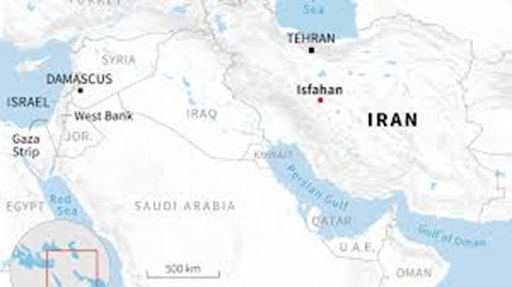What We Know About Israel’s Strike in Iran
Israel
struck Iran early Friday, according to officials from both countries, in what
appeared to be its first military response to the Iranian attack on Israel last
weekend.
Israel struck Iran early on Friday, according to officials
from both countries, in what appeared to be its first military response to the
Iranian attack on Israel last weekend.
The strike was the latest in a cycle of retaliation between
the two foes that has alarmed world leaders, who fear that back-and-forth
attacks could erupt into a broader war.
Here is a look at what we know about the strike and its implications.
What did Israel strike?
Iranian
officials said on Friday that an Israeli strike hit a military air base near
Isfahan, a city in central Iran. The scale and method of the attack were
unclear.
Iranian officials said a separate Israeli attack was
thwarted in Tabriz, a region roughly 500 miles north of Isfahan. Iranian news
agencies said explosions were heard near both cities.
The state media in Syria, a major Iranian ally
that borders Israel, said also that Israeli missiles had hit air-defense
positions in southern Syria on Friday.
The Israeli military declined to comment.
Why did Israel strike?
Israel attacked Iran in retaliation for a large Iranian
attack on Israeli territory last weekend that included more than 300 missiles
and drones.
That attack frightened Israelis but caused little damage and
few injuries because nearly all of Iran’s weapons were intercepted by Israel
and its allies, including the United States, Britain and Jordan.
That Iranian
attack was launched in response to an Israeli strike on an Iranian
diplomatic compound in Syria on April 1, which killed seven Iranian officials.
Israeli officials did not warn the United States of the Damascus strike and
some have since privately conceded that it was a serious miscalculation.
Will Iran retaliate?
It was not clear whether or not Iran would retaliate, but
the initial reaction in Israel and Iran, where some officials and state-backed
media sought to downplay the strike’s severity, suggested that its response may
be muted.
Iranian state TV broadcast footage of Isfahan looking
peaceful, and reported that military
and nuclear facilities there were undamaged. One newsreader told viewers the
strike was “not a big deal.”
Officials in Israel said the strike had been designed to
avoid escalating tensions.
Why is Isfahan important?
Isfahan is
one of Iran’s most famous and historic cities, known for its beautiful
turquoise and purple tiled mosques, picturesque arched bridges, and Grand
Bazaar.
The area is also home to four small nuclear research
facilities and is a center of Iranian weapons production. Many of the country’s
Shahab
medium-range missiles — which can reach Israel and beyond — are assembled
there.
The province of Isfahan also contains the Natanz uranium
enrichment site, as well as an air base that is home to a fleet of
American-made F-14 Tomcats. They were purchased by the U.S.-backed Iranian
government before the 1979 Islamic revolution, according to The Associated
Press.
Implications for "My Amazon Bee":
Geopolitical Uncertainty: The strike exacerbates
tensions in the region, impacting global markets and supply chains. "My
Amazon Bee" must brace for fluctuations in consumer behavior, logistics,
and regulations, affecting client campaigns
and profitability.
Economic Fallout: Heightened geopolitical tensions
often correlate with economic uncertainty. As sanctions and countermeasures
loom, "My Amazon Bee" may face challenges in budget allocation,
client retention, and revenue projections.
Market Volatility: Investor sentiment reacts
sensitively to geopolitical unrest. "My Amazon Bee" must monitor
market fluctuations closely, adapting advertising strategies and client
recommendations accordingly to mitigate financial risks.
Strategic Adaptation: The strike underscores the
importance of agile decision-making and diversified partnerships. "My Amazon
Bee" must reassess its contingency plans, explore alternative market channels,
and fortify client relationships to navigate through geopolitical turbulence.




Comments
Post a Comment